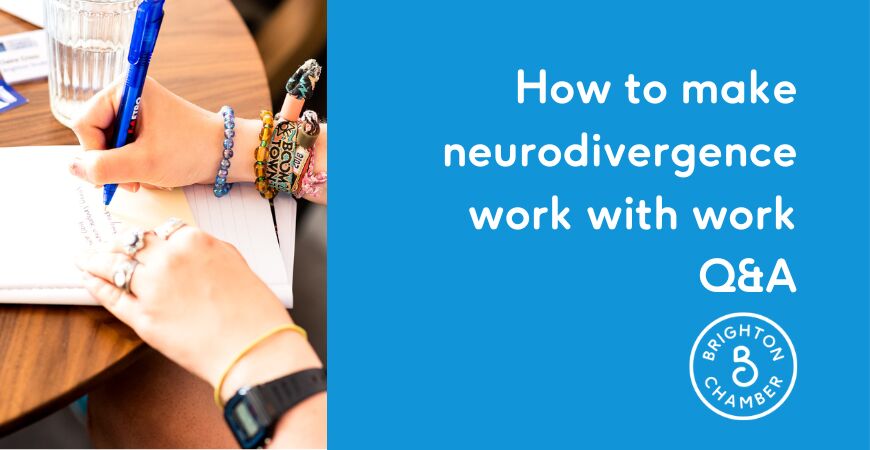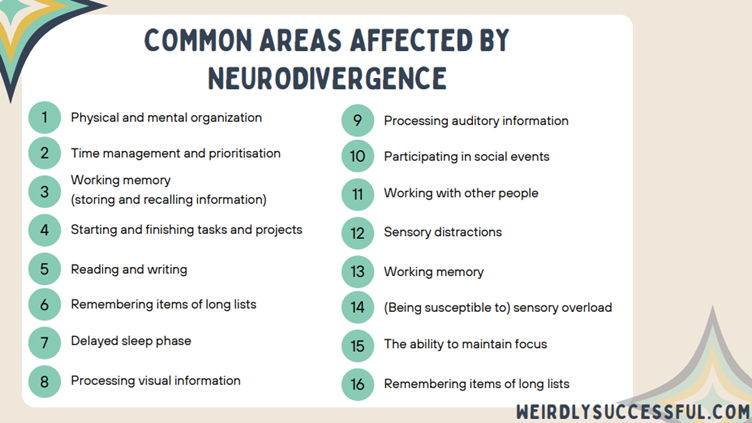

Mon 06 / 02 / 23
Q&A: How to make neurodivergence work with work
Amy Lishman, Head of Member Engagement, chats to Adam Dobay and Livia Farkas from Weirdly Successful to discuss how to better support a neurodivergent workforce, and what success looks like.
By Frank Hyde of Brighton Chamber
How does neurodivergence relate to work in the first place?
There are a couple of disclaimers before we start – a lot of advice around neurodivergence is developed and given by people who aren’t neurodivergent themselves, but have just done research into it. That isn’t the case here; we are both neurodivergent.
Rather than starting with some definitions or anything too complicated, we want to tell you about a tale of two tech companies:
Company A had a brilliant designer who was known as the ‘quirky’ one in the office. One Friday, they were all told that they were moving offices next week and that they needed to pack up all their stuff and transfer it to the new location. And this designer went into complete shock – he did pack his stuff, but he didn’t return to the office for the next 9 months; requesting instead to work from home (and this was years ago, before working from home became commonplace). And it wasn’t because he didn’t want to come to the office, it was because the massively overwhelming nature of such a big disruption to his entire routine and schedule was something that he needed support with, but he didn’t get it. So for nine months he essentially worked in isolation. Eventually, he came up with his own accommodations but it took nine months and a huge amount of distress – and he had to deal with that on his own.
Company B, however, did things differently. They also moved office but the management gave them six months’ notice, a detailed plan of the moving process, time to survey the new location and work out travel plans, a given person who was in charge of the packing, and opportunities to discuss the move both in person and through anonymous questions.
In essence, this example shows the difference between a company that has strategies in place to support neurodivergent employees and one that doesn’t. And importantly, it doesn’t matter whether someone is diagnosed or not. It’s about people needing support, and having both proactive and reactive strategies in place when obstacles do come up.
Neurodivergence is very prevalent, but it really doesn’t matter whether you are diagnosed or not. If you need support, then you need support – it doesn’t matter why you need it. The desire to treat people fairly should be enough, but even from an ultra-capitalist perspective it is important, because wellbeing leads to job satisfaction, motivation and ultimately productivity.
What neurodivergent traits affect the way we work?
We have a handy slide just for this!

To what extent is it important to understand the individual characteristics of the individual conditions or can you focus on the social model and the processes/practices that are causing the issue?
The term neurodivergence was originally only used to refer to autism, but the definition has been widened to cover a range of neurodevelopmental conditions and specific learning difficulties. We don’t want to get into science too much, but there are a few things we want to clarify because lots of companies still base their policies and decisions on information that is outdated by 20-30 years.
The prevalence of neurodivergence is a lot higher than was previously thought. As the diagnostic criteria is updated and improved, fewer people fall through the cracks. It has also led to a huge upsurge of adults realising that they had some sort of neurodivergence all their life. And when you add all the people who have some sort of challenge with a neurodivergent trait – regardless of whether they meet the diagnostic threshold or not – then it affects 20-25% of people. And this is why it’s so important to look at how to support the challenges that neurodivergent people face in the workplace. Some people will never get a diagnosis, or even identify as neurodivergent, but they may still face struggles in certain areas because of the way that their brain is wired, and it is important that they are supported.
Despite the rise in neurodivergent diagnoses, adults are still massively under- and mis-diagnosed, and this is especially prevalent in women. This is because neurodivergence often presents differently in women, and traits are often dismissed early on. Adult neurodivergence is often difficult to diagnose because as you get older, a lot of the more visible traits associated with neurodivergence become internalised.
It's important to note that a lot of neurodivergent traits overlap – for example, 60-80% of people with ADHD are also autistic. This is another reason why it’s so important to focus on the challenges that neurodivergent people face, rather than the label they are diagnosed with.
The social model is a way of understanding disability which considers how the environment disables the person – rather than the old school model of “what is wrong with this person”. This can become quite complicated when looking at neurodivergence, because although you can improve external products and processes, the underlying neurodivergence doesn’t go away.
Additionally, there is no best practice manual in the same way that there might be for physical impairments. Putting a ramp next to stairs will help everyone who can’t climb stairs, regardless of the reason – but no amount of planners or stickers will ‘remove’ someone’s executive dysfunction. Some things will work for some people but not others – or even work sometimes and not work another time. It’s a learning experience for both the employer and the employee, so you need constant communication and dialogue.
Are there any myths to debunk, or one-size-fits-all approaches that don’t work?
One of my pet peeves is when people say “just write things down”. I’m a big planner person, but it matters so much where I write it, in what style, with what materials, and how it fits in with my brain. Time management for neurodivergent people is such a personal thing that the best planner will be the one that makes sense and works for you – so the generalised approach of “use a planner” solves absolutely nothing without going in deeper and formulating a system.
Another thing that often doesn’t work so well for neurodivergent people is the 9-5 system as a whole – we like to start small! A lot of neurodivergent conditions involve delayed sleep phases or disrupted sleep, along with highs and lows in focus and functioning that change from day to day. And people who deal with this often have enough experience to know what their realistic expectations are, and how best to work with their conditions, and this is not possible with a strict office-based 9 to 5. Essentially, the more inflexible your work is, the less inclusive it is.
As an example, when I worked a 9 to 5 I used to spend eight hours at work getting very little done, because the environment was disabling to me and took up all my mental energy. But then, I would get up in the middle of the night and complete all eight hours’ worth of work between midnight and 2am. It’s important that your professional worth criteria is not based on hours, but on whether the work gets done to the expected standard.
What should I be aware of as a manager of a neurodivergent employee, and how can I support them in optimising their performance?
A lot of companies like to look at performance and output when thinking about providing support to neurodivergent employees, but one of the most efficient ways of helping is by lowering their barriers to entry. One is example of this is automating a process that opens all the different software programmes you will need that day – so that your set-up process has only one step. This makes it a lot easier for people struggling with executive dysfunction, and means that they can focus their energy on the task itself rather than the set-up.
Another essential factor is how you communicate. Small things like not just telling someone their task, but writing it down or sending it to them – or even the opposite, as some people need the audio component. Find out how your employee best receives information and tailor your communication to that. Look at tweaking your processes to see how you can make things easier. And remember that doing this isn’t letting your employee ‘slack off’, it’s adjusting the difficulty of the task to the same level as everyone else finds it.
An important thing to note that making these accommodations will not necessarily have a direct impact on productivity in terms of the amount of work your employee is doing – but it changes how they feel whilst doing the same amount of work. Being in a non-accessible environment can be exhausting, so although you might not see day-to-day productivity increases, it will help to avoid long-term burnout.
How did your recent diagnosis affect your life, why did you push for it? How did it impact the running of your business?
For me personally, my diagnosis was incredibly validating and a massive takedown of imposter syndrome. There’s a lot of expectations that you put on yourself, especially as a small business owner, and it’s reassuring to know that I’m not lazy like I’ve always been told. It helped me to understand that financially, the reason we weren’t making as much money as we thought we needed to keep the company afloat was because we were fighting our own executive functioning the whole time.
Being able to put names to things and recognise the traits and symptoms that we were experiencing meant that we were able to better look for solutions. When it came to my executive dysfunction, I had spent decades trying all the lifestyle changes they recommend – I did the yoga, meditation, workouts, diets… And while these are all good things to do, it’s the equivalent of expecting a diabetic to be able to think themselves into producing more insulin – it just doesn’t work. And getting a diagnosis meant that I was finally able to be on my correct medication, which has made a huge difference.
Being able to put a name to what I was experiencing meant that I could notice potential problems earlier, understand what I need, and appreciate better the needs of others.
Why is practicing self-care and compassion crucial?
Whether you have a neurodivergent diagnosis or not, living with expectations you can’t meet is exhausting. This is a key difference between executive dysfunction and laziness – lazy people don’t care about the things they aren’t doing. But if you have executive dysfunction, you blame yourself constantly, so it’s exhausting even when you aren’t getting anything done! Because of this, allowing yourself to not do things that you can’t manage can be an incredibly important form of self-care. And even if you do have the brain function to do more work, it doesn’t mean you should. You need to have internal empathy for yourself, because productivity means nothing if you don’t enjoy your life. Self-care and self-compassion comes with a big set of boundaries and the ability to say no to things.
On the practical side of things, self-awareness is key. Lots of neurodivergent people have an extreme need to fit in, and so they stop paying attention to what their own needs are, especially as adults. It might involve lots of unlearning, but you need to think about what your actual needs are and how you can accommodate them. Sometimes, needs can’t be addressed perfectly but you can compromise – it’s not all or nothing.
Is there anything employers should specifically prioritise in physical workspaces to support neurodivergent employees?
Here we come back to the fact that there is no one-size-fits-all approach. A dialogue needs to be started for each company and each individual involved. One easy suggestion might be to develop a system for knowing when someone is available for communication. Some things, like specific software or noise-cancelling headphone can be accessed using the Access To Work Government Program. But basically, you just need to talk to your employees.
We are currently working on developing a ‘check-in checklist’, which is a list of questions that employers can ask to understand the workplace needs of their employees – you can sign up here to get it when it’s ready!
Adam and Livia are founders of Weirdly Successful, a company which supports neurodivergent employees by providing strategies and frameworks which help in the workplace.
If you want to contribute to the Chamber blog, contact us on hannah@brightonchamber.co.uk



